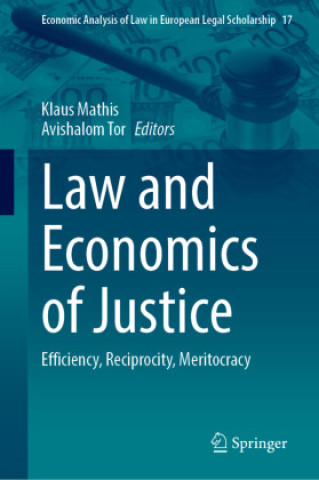
Code: 45116977
Law and Economics of Justice
by Klaus Mathis, Avishalom Tor
While previous volumes have examined specific issues and developments such as the coronavirus crisis or digital transformation from a law and economics perspective, the anniversary edition returns to the methodological and philoso ... more
- Language:
 English
English - Binding: Hardback
- ISBN-13: 9783031568213
Publisher: Springer, Berlin, 2024
- More about this

218.75 €

Low in stock at our supplier
Shipping in 13 - 16 days
Potřebujete více kusů?Máte-li zájem o více kusů, prověřte, prosím, nejprve dostupnost titulu na naši zákaznické podpoře.
Add to wishlist
You might also like
-

Gravity Falls Journal 3
16.43 € -23 % -

Berserk Deluxe Volume 1
44.27 € -12 % -

Berserk Deluxe Volume 2
52.13 € -

White Nights
3.52 € -23 % -

It ends with us
8.66 € -19 % -

Berserk Deluxe Volume 3
48.70 € -3 % -

48 Laws Of Power
17.94 € -9 % -

A Little Life
17.44 € -

Surrounded by Idiots
10.48 € -29 % -

Atomic Habits
15.93 € -14 % -

The Official Stardew Valley Cookbook
22.28 € -22 % -

Jujutsu Kaisen, Vol. 23
9.67 € -26 % -

Berserk Deluxe Volume 4
45.17 € -10 % -

Iron Flame
16.23 € -18 % -

The 48 Laws of Power
24.50 € -5 % -

A Good Girl's Guide to Murder
8.16 € -25 % -

Powerless
10.38 € -19 % -

Berserk Deluxe Volume 5
50.32 € -

A Curse For True Love
10.38 € -12 % -

Twisted Hate
10.18 € -14 % -

Reckless
10.28 € -20 %
Give this book as a present today
- Order book and choose Gift Order.
- We will send you book gift voucher at once. You can give it out to anyone.
- Book will be send to donee, nothing more to care about.
More about Law and Economics of Justice
You get 549 loyalty points
 Book synopsis
Book synopsis
While previous volumes have examined specific issues and developments such as the coronavirus crisis or digital transformation from a law and economics perspective, the anniversary edition returns to the methodological and philosophical fundament of the discipline of law and economics. The present book aims to examine these foundations in general and, in particular, efficiency, reciprocity and meritocracy, and their relation to law and justice from an interdisciplinary perspective.Efficiency: Traditionally, the economic analysis of law has been guided by the goal of efficiency. Economists usually define efficiency as Pareto or Kaldor-Hicks efficiency. Any change that makes one member of society better off without anyone else being worse off is a Pareto improvement. A change is a Kaldor-Hicks improvement if the gainers value their gains more than the losers value their losses, with only hypothetical compensation required.Reciprocity: Economists have traditionally based their models on the self-interest hypothesis of homo oeconomicus. In this model, an individual maximises his own utility without being altruistic or jealous. Behavioural economics challenges the self-interest hypothesis. In fact, many people deviate from purely self-interested behaviour. There are also signs that considerations of fairness and mutual benefit are important in bilateral negotiations and in the functioning of markets. Meritocracy: The concept of meritocracy refers to a system, organisation, or society in which people are selected and promoted to positions of success, power, and influence on the basis of their abilities and merits. This means that an individual is able to climb the social ladder through hard work. Moreover, meritocracy directs the most talented people into the most functionally important positions, thereby increasing a society's efficiency. However, the equalising function of meritocracy has been criticised. Rather than reducing inequality, meritocracy is seen as the cause of racial, economic and social inequality.
 Book details
Book details
Book category Books in English Law International law Public international law
218.75 €
- Full title: Law and Economics of Justice
- Subtitle: Efficiency, Reciprocity, Meritocracy
- Author: Klaus Mathis, Avishalom Tor
- Language:
 English
English - Binding: Hardback
- EAN: 9783031568213
- ID: 45116977
- Publisher: Springer, Berlin
- Dimensions: 235 × 155 mm
- Date of publishing: 07. June 2024
Collection points Bratislava a 2642 dalších
Copyright ©2008-24 najlacnejsie-knihy.sk All rights reservedPrivacyCookies


 15549 collection points
15549 collection points Delivery 2.99 €
Delivery 2.99 € 02/210 210 99 (8-15.30h)
02/210 210 99 (8-15.30h)